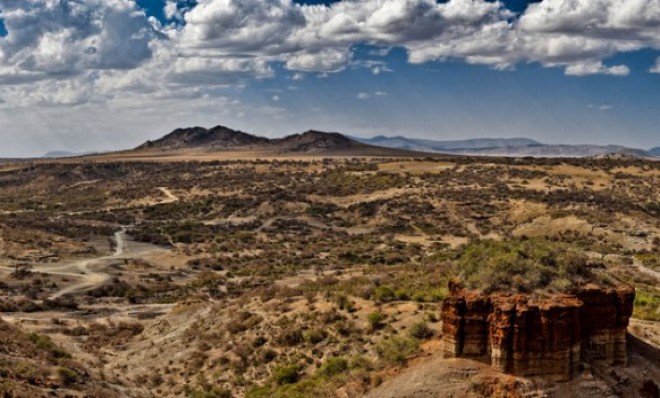Did a rapidly changing climate make early humans smarter?
A new study points out that a constantly shifting environment may have forced us to get smart or die trying

The question: Scientists are always on the hunt for clues in our evolutionary history that might help explain why we have such highly advanced brains. Some have pointed to the advent of cooked food as a tipping point, giving our brains the nutrients and proteins needed to grow. Others say it's the invention of agriculture, which diverted our attention away from merely surviving to more intellectual pursuits. Now, scientists from Penn State University think the rapidly fluctuating climate some 2 million years ago may have forced homo erectus — a direct ancestor of modern humans — to change their behavior as they migrated from the forest to the dry, flat grasslands and back again. Did climate change spark a period of major intelligence gains?
How it was tested: Researchers focused on a region in Africa called the Olduvai Gorge — an area where humankind is thought to have originated. Scientists believed that the area began drying up 3 million years ago in something they call the "Great Drying," robbing the area of trees and other lush plant life. Biochemists used techniques like gas chromatography and mass spectrometry to analyze carbon isotopes from wax leaf samples. With that data, they were able to create a timeline for the amount of vegetation in the area over a period of 200,000 years.
The outcome: The area didn't dry out slowly and consistently over time, but was instead highly variable, meaning it was changing all the time. In just 10 to 100 generations, early humans would have had to migrate from areas with trees and forest cover to vast open areas with only grass — and vice versa. The temperature was constantly in flux, possibly as a result of changes in the Earth's orbit around the sun. More intriguingly, variability in the environment happened to coincide with a critical period in human evolution when the first hand tools began to emerge.
The Week
Escape your echo chamber. Get the facts behind the news, plus analysis from multiple perspectives.

Sign up for The Week's Free Newsletters
From our morning news briefing to a weekly Good News Newsletter, get the best of The Week delivered directly to your inbox.
From our morning news briefing to a weekly Good News Newsletter, get the best of The Week delivered directly to your inbox.
What the experts say: "Changes in food availability, food type, or the way you get food can trigger evolutionary mechanisms to deal with those changes," says researcher Clayton Magill. "The result can be increased brain size and cognition, changes in locomotion, and even social changes — how you interact with others in a group. Our data are consistent with these hypotheses." Yes, "there was a complete restructuring of the ecosystem from grassland to forest and back again," says researcher Katherine Freeman. "I've worked on carbon isotopes my whole career, and I've never seen anything like this before."
The takeaway: The Great Drying may not have happened after all, and our homo ancestors were likely forced to adjust to a brutal, changing landscape in just a few generations. In other words: We either had to get smart fast, or die trying.
A free daily email with the biggest news stories of the day – and the best features from TheWeek.com
-
 Political cartoons for December 21
Political cartoons for December 21Cartoons Sunday’s political cartoons include Christmas movies, AI sermons, and more
-
 A luxury walking tour in Western Australia
A luxury walking tour in Western AustraliaThe Week Recommends Walk through an ‘ancient forest’ and listen to the ‘gentle hushing’ of the upper canopy
-
 What Nick Fuentes and the Groypers want
What Nick Fuentes and the Groypers wantThe Explainer White supremacism has a new face in the US: a clean-cut 27-year-old with a vast social media following